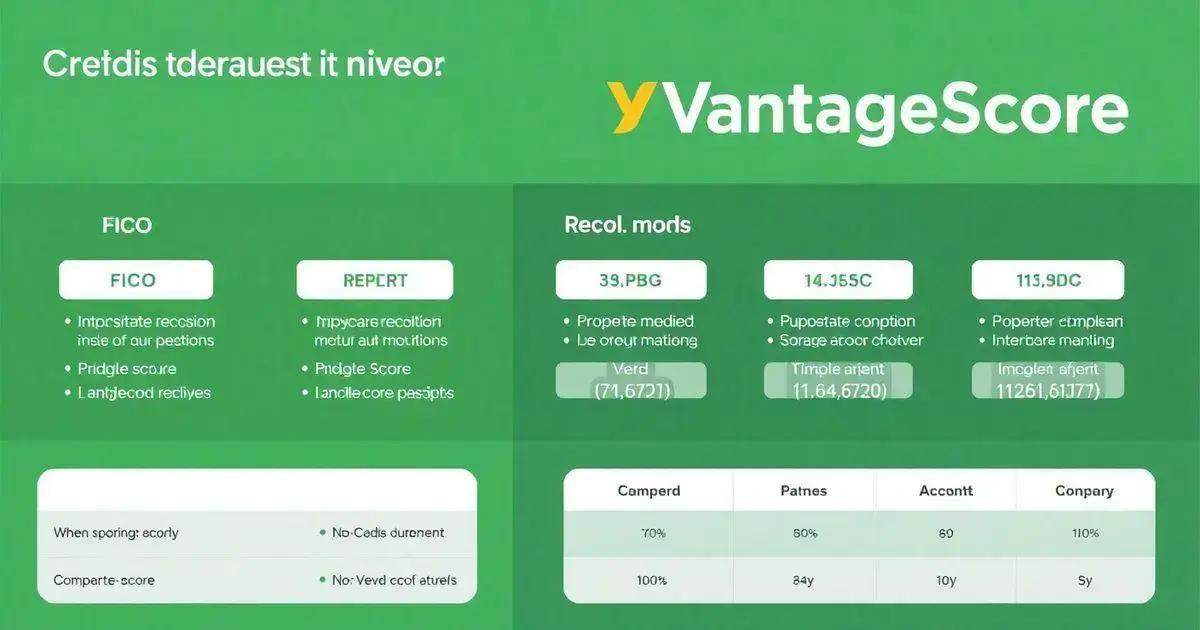Credit score calculation models, like FICO and VantageScore, serve as the backbone of your financial profile, influencing decisions on loans, credit cards, and interest rates. By evaluating factors such as payment history, credit utilization, and the length of your credit history, these models provide a snapshot of your creditworthiness.
Recognizing the components of these models can help you take control of your financial future. Consistently paying bills on time, keeping debts low, and maintaining a mix of credit types are just a few strategies to boost your score. Staying informed empowers you to access better financial opportunities.
Dive deeper into the details of credit score calculation models and discover how they can pave the way to smarter financial choices and greater financial freedom!
Understanding Credit Score Calculation Models
Understanding credit score calculation models is essential for anyone looking to manage their finances effectively. These models evaluate different factors that contribute to your credit score, providing a comprehensive view of your creditworthiness. By knowing how these models work, you can take actions to improve your score and secure better financial opportunities.
Key Components of Credit Score Calculation Models
There are several key components in credit score calculation models. These components include:
- Payment History: Your track record of on-time payments makes up a significant part of your score.
- Credit Utilisation: This refers to the percentage of your available credit that you are currently using.
- Length of Credit History: A longer credit history can positively impact your credit score.
- Types of Credit: Having a variety of credit types, such as mortgages, credit cards, and loans, can benefit your score.
- New Credit Inquiries: Each time you apply for credit, it counts as an inquiry and can temporarily lower your score.
Importance of Different Models
Different credit bureaus may use various scoring models, such as FICO or VantageScore. Each model weighs the components differently, so it’s important to understand that your score might vary between these models. Knowing which model a lender uses can help you prepare accordingly.
How This Knowledge Can Help You
By understanding credit score calculation models, you can make informed decisions. For example, if you know that payment history is crucial, you will prioritise paying bills on time. Furthermore, understanding how different models work can help you anticipate how certain actions, like applying for new credit, may affect your score.
Conclusion to Embrace
By embracing the knowledge of credit score calculation models, you can take charge of your financial future. Improvement in your score can lead to better loan options, lower interest rates, and overall financial health improvement.
How Credit Scores Are Calculated

Credit scores are calculated using various factors that reflect how responsibly a person manages credit. The calculation involves breaking down your financial history into easily measurable components to derive your score. Understanding these factors helps you know how to influence your credit score positively.
The Key Factors in Credit Score Calculation
Here are the main components that affect how credit scores are calculated:
- Payment History (35%): This is the most important factor. It records if you have paid your credit accounts on time. Late payments, collections, and bankruptcies can significantly lower your score.
- Credit Utilisation (30%): This ratio compares your total debt to the total credit available to you. Keeping your usage below 30% is generally best to maintain a strong score.
- Length of Credit History (15%): This considers how long your credit accounts have been active. Older accounts may positively impact your score, showing a longer, stable credit history.
- Types of Credit (10%): A mix of different types of credit accounts, such as revolving credit (like credit cards) and installment loans (like car loans), can improve your score.
- New Credit Inquiries (10%): Each time you apply for new credit, a hard inquiry appears on your report. Too many inquiries in a short period can lower your score.
The Calculation Process
Credit bureaus use algorithms that evaluate the above factors to compute your score, typically on a scale from 300 to 850. A higher score indicates better creditworthiness and can lead to lower interest rates and better loan offers.
Impact of Accurate Information
Ensuring that your credit report is accurate is crucial because errors can negatively affect your score. Regularly review your report for mistakes and dispute any inaccuracies you find.
Monitoring Your Score
Lastly, regularly monitoring your credit score can help you understand how your actions affect it. You can track improvements and adjust your financial habits accordingly for better scores.
The Role of Credit History in Score Calculations
The role of credit history in score calculations is crucial. Your credit history shows how you have managed credit over time. Lenders use this history to determine the level of risk they face in lending to you.
How Credit History Affects Your Score
Your credit history includes information about your credit accounts, such as:
- Account Types: This details the different types of credit you have, including credit cards, car loans, and mortgages.
- Payment Patterns: It shows whether you have paid your bills on time or if you have any missed payments.
- Open Accounts: The number of accounts that are currently open can help reflect your credit management skills.
- Closed Accounts: This includes accounts you have paid off, which can positively or negatively impact your score depending on their history.
Importance of a Positive Credit History
A positive credit history can lead to higher credit scores, making it easier to secure loans with better terms. Lenders may offer lower interest rates, helping you save money over time. On the other hand, a negative history can signal to lenders that you may be a higher risk, resulting in higher rates or denied applications.
Monitoring Your Credit History
It is essential to regularly monitor your credit history. This allows you to catch any errors or fraudulent activities that may hurt your score. You should ensure that your history reflects accurate and up-to-date information.
Improving Your Credit History
To enhance your credit history, focus on making timely payments and keeping your credit utilisation low. Building a diverse credit mix over time can also be beneficial. Remember, positive credit behaviour can turn your credit history into a strong asset for accessing financial opportunities.
Different Models Used by Credit Bureaus

Credit bureaus use different models to calculate credit scores, and understanding these can help you manage your financial health effectively. The two most well-known models are FICO and VantageScore, though there are others as well. Each model has its unique methods for assessing creditworthiness.
FICO Score
The FICO score was developed by the Fair Isaac Corporation and is used by most lenders. This score ranges from 300 to 850 and considers factors like:
- Payment History: Accounts for 35% of the score.
- Credit Utilisation: Represents 30% of your score.
- Length of Credit History: Accounts for 15%.
- Types of Credit: Makes up 10% of the score.
- New Credit: Contributes 10%.
FICO scores help lenders predict how likely a person is to repay borrowed money. Higher scores generally open up better financing options.
VantageScore
VantageScore was developed by the three major credit bureaus: Equifax, Experian, and TransUnion. It ranges from 300 to 850 as well, but it uses a different system for calculating scores. The key elements include:
- Payment History: Counts for about 40% in early models, now 20% in newer versions.
- Credit Utilisation: Affects the score significantly.
- Credit Mix and New Accounts: Each category holds importance in the total scoring.
VantageScore evaluates your creditworthiness similarly to the FICO model, but the exact percentages and their calculations can differ.
Other Credit Scoring Models
Besides FICO and VantageScore, other models like Equifax Risk Score and Experian Score exist. These also assess credit risk but may rely on different criteria or algorithms.
Understanding which model your lender uses is critical because your score may vary depending on the model. It’s essential to periodically check your credit report and understand the scoring models most relevant to you.
Improving Your Credit Score Based on Calculations
Improving your credit score is vital for unlocking better financial opportunities. By focusing on specific credit score calculation models and strategies, you can enhance your creditworthiness over time. These models analyze various factors, and understanding them can guide your efforts toward a healthier credit profile.
Pay Your Bills on Time
One of the most significant factors in credit score calculation models is your payment history. Ensure that you pay all your bills on time to build trustworthiness. Setting up reminders or automatic payments can help avoid missed deadlines and keep this factor in good standing.
Reduce Credit Utilisation
Credit utilisation, another key component in credit score calculation models, refers to the ratio of your current debt to your total available credit. Aim to keep this ratio below 30%. Paying down existing debt and avoiding large purchases on credit can help maintain a low utilisation rate.
Check Your Credit Reports
Regularly review your credit reports from the major bureaus to ensure accuracy. Look for errors or outdated information that may negatively affect your score. Correcting such issues can significantly impact how credit score calculation models evaluate your creditworthiness.
Diversify Your Credit Types
Having various types of credit accounts, like credit cards, car loans, or mortgages, can enhance your score. While diversity is beneficial, it’s crucial to manage these accounts responsibly. Avoid unnecessary loans just to improve your credit mix.
Avoid Frequent Credit Inquiries
Each time you apply for credit, a hard inquiry is recorded, which can temporarily lower your score. Limiting credit applications ensures you minimise these impacts. If you’re shopping for loans, do so within a short period to reduce the effect on your score.
Establish a Lengthy Credit History
The length of your credit history is another significant factor considered in credit score calculation models. If possible, keep older accounts open, even if they’re not frequently used. This can demonstrate stability and improve your overall credit profile.
By following these steps and staying informed about the key components of credit score calculation models, you can steadily build and maintain a strong credit score.
FAQ – Frequently Asked Questions about Credit Score Calculation Models
What is a credit score?
A credit score is a numerical representation of your creditworthiness, used by lenders to assess the risk of lending to you.
How is my credit score calculated?
Your credit score is calculated based on factors including your payment history, credit utilisation, length of credit history, types of credit, and new credit inquiries.
What is the difference between FICO and VantageScore?
FICO and VantageScore are two different scoring models used by credit bureaus to evaluate credit risk. They use varying methods and weight factors differently.
How can I improve my credit score?
You can improve your credit score by paying your bills on time, reducing credit utilisation, checking your credit reports for accuracy, diversifying credit types, and avoiding frequent credit inquiries.
Why is my payment history so important?
Your payment history is the most significant factor in your credit score, as it reflects your reliability in repaying borrowed money.
What should I do if I find an error on my credit report?
If you find an error on your credit report, you should dispute it immediately with the credit bureau to ensure your credit history is accurate.
Check out our article on Low Credit Score to understand its impact and explore practical steps to improve your creditworthiness.
